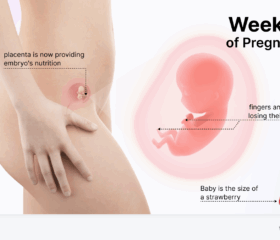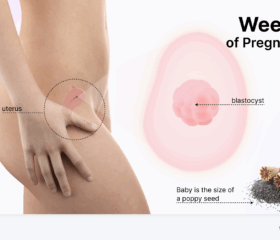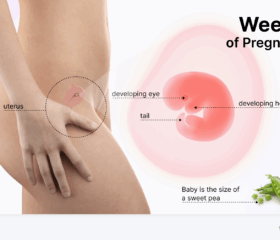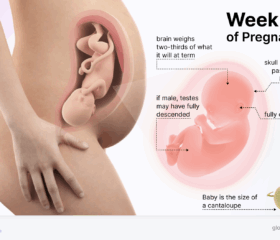Pregnancy Week by Week
11 Weeks Pregnant
Your baby is as big as a fig.
1.6
inches
0.25
ounces
11 Weeks Pregnant: Symptoms, Changes in Your Body, and Tips to Follow
As you get closer to your second trimester, you may start noticing more visible signs of pregnancy, including changes in your belly (although it’s entirely possible your bump won’t start to show just yet, especially if this is your first pregnancy).
Those challenging early symptoms, like morning sickness and fatigue, will soon become less intense. However, this week will still probably require you to actively manage your symptoms.
Read on to learn what’s happening with your baby and your body and how you can stay healthy at 11 weeks pregnant.
Your baby at 11 weeks
At 11 weeks, your baby is about the size of a lime or a fig, measuring around 1.6 inches in length and weighing around 0.25 ounces. 1 Though she’s still small, she’s no longer an embryo—she’s now considered a fetus.
Your baby’s features are a lot more defined than they were just a few weeks ago. The biggest recent developments include:
- Organs: By the end of this week, your baby’s vital organs will have fully formed.
- Fingers and toes: Her fingers and toes are no longer webbed, and the beds for her fingernails and toenails are starting to form.
- Facial features: Her eyes are moving closer together, and her ears are moving into their final position. The follicles for your baby’s hair are also beginning to form.
- Brain development: Your baby’s brain is now developing both hemispheres, with the left side responsible for logic and reasoning, and the right side preparing to handle language processing.
- Mouth movements: In a big milestone for your baby, she can now open and close her mouth.
- Genitals: Her genitalia is continuing to grow, though you’ll still need to wait a few more weeks before you can find out your baby’s sex on an ultrasound. If your baby is a girl, her ovaries will start to form.
To get a better idea of how your baby’s growing every week, consider using a pregnancy tracker app (the best pregnancy trackers provide helpful size comparisons and 2D and 3D illustrations).

Pregnancy symptoms at week 11
You may still feel the same pregnancy symptoms that you did in the previous weeks. The most common symptoms at 11 weeks pregnant include:
- Fatigue: You’ve no doubt been feeling extra tired these past few weeks, caused by hormonal changes and the demands of early pregnancy.
- Nausea: The dreaded morning sickness is still ongoing. While nausea may be easing up, you’ll probably still need to run to the bathroom frequently.
- Gas and bloating: Is your tummy extra vocal lately? Your body’s hormonal changes may also affect your digestive system, leading to more gas and bloating during your pregnancy (and you feeling all the more uncomfortable).
- Heartburn: While heartburn often starts later in pregnancy for many women, it’s also a common issue during the first trimester. Many women experience this condition, which is caused by acid reflux, for the first time during pregnancy.
- Mood swings: Hormonal fluctuations can leave you feeling up one minute and down the next. Understanding when pregnancy mood swings start can help you anticipate and manage these emotional shifts.
- Leg cramps: Leg cramps are common in the early stages of your pregnancy. These tight, painful cramps often occur at night (which, of course, is the last thing you need when you’re feeling extra tired).
- Vaginal discharge: It’s normal to experience increased vaginal discharge during pregnancy, which is your body’s way of keeping the vagina clean and free from infection. This should be clear or milky and not accompanied by strong odors (although it may be accompanied by itching).
- Nasal congestion: You may have a stuffy or runny nose, stemming from a condition known as pregnancy rhinitis. This occurs due to the increased blood flow to your nasal passages and the enlargement of your nasal veins.
Although these symptoms can be unpleasant, you’ll be pleased to know that many women start to feel better once they reach their second trimester. You’re almost there!
Your body at 11 weeks
Alongside the symptoms we just mentioned, you may start to notice other changes in your body at 11 weeks. Every woman is different, but this may be the first time you start to really “look” pregnant.
You may see the following changes:
- Belly changes: At this stage, you may start showing. Your belly may have a slight bump or feel “tighter.” If it’s your first pregnancy, these changes will probably be subtle, but if it’s your second pregnancy or you’re carrying multiples, you might notice a bump earlier.
- Breast changes: Your breasts may feel fuller, heavier, and more sensitive due to hormonal shifts.
- Skin changes: You may see the development of the linea nigra—a dark vertical line that appears down the center of your abdomen. Other common skin changes include an increase in pigmentation (darkening), pregnancy acne, or dryness.
Your risk of miscarriage has reduced significantly
By 11 weeks, your risk of miscarriage has dropped to less than 1%. If you’ve seen your baby’s heartbeat during your ultrasound, you’ve probably passed the danger zone.
With the risk of miscarriage reduced, many women choose this time to announce their pregnancy, at least to their friends and family. It’s always a personal decision when you decide to tell your loved ones that you’re expecting, but if you haven’t spilled the beans yet, now might be a decent time.
How to look after yourself and your baby in week 11
Protect you and your baby’s health by being proactive. Ask your doctor about any vaccinations you need to get during pregnancy (note that you can get the flu shot while pregnant, regardless of what trimester you’re in).
You can also make sure you’re managing your current symptoms properly. Here are several ways you can cope with the more challenging symptoms you might be enduring and make sure your baby has everything she needs as you go into your second trimester.
Stay moderately active
Staying active during your pregnancy improves your circulation, puts you in a better mood, and can even mitigate nausea.
If you didn’t work out much before getting pregnant, start with short, easy walks and gradually increase the distance and intensity. Regular stretching is also a great way to combat cramping.
Remember not to overexert yourself—it’s important to listen to your body, and if anything makes you uncomfortable, stop. It’s also never a bad idea to run your new routine by your doctor.
Look after your skin
Stretch marks are largely genetic, but moisturizing regularly can help keep your skin hydrated and elastic. Look for creams or oils rich in vitamins C and E, which support skin health.
Drinking plenty of water and maintaining a balanced diet will also help nourish your skin from the inside out.
Take it easy
If the infamous pregnancy fatigue of the first trimester is taking a toll on you, engage in relaxing activities, such as:
- Yoga
- Prenatal massage
- Deep breathing exercises
- Meditation
- Journaling
- Painting or drawing
As always, feel free to lean on your partner, family, and friends for physical and emotional support when you need it.
Eat well
Incorporate a variety of fruits, vegetables, whole grains, lean proteins, and healthy fats into your pregnancy diet. You’ll want to particularly focus on these nutrients:
- Calcium: Calcium is essential for your baby’s developing bones and teeth. Aim for about 1,000 milligrams of calcium daily (equivalent to about 2 slices of Gouda cheese or 2–3 Tums tablets). Dairy products like milk, yogurt, and cheese are excellent sources, but you can also find calcium in fortified plant-based milk, almonds, tofu, and leafy greens.
- Iodine: Focus on foods rich in iodine, such as dairy, eggs, and iodized salt. Iodine supports the development of your baby’s nervous system.
- Folate: This essential nutrient prevents neural tube defects in your developing baby. You can get enough folate (about 400 mcg/day) by eating leafy greens, legumes, and fortified cereals.
To mitigate heartburn, avoid spicy, fatty, and acidic foods that can trigger acid reflux. After eating, resist the urge to lie down immediately. Instead, wait at least 30 minutes to allow your body to digest your food.
Eating smaller, more frequent meals throughout the day can also prevent heartburn and bloating. So can separating your consumption of solids and liquids (rather than consuming both at mealtimes).
Drink enough water
The general guideline is to drink at least 8–12 cups (64–96 ounces) of water per day. As your pregnancy progresses into the second trimester, you may need more.
Staying hydrated also helps prevent common pregnancy issues like constipation, urinary tract infections, and swelling.
Know which painkillers you can use
As painful as some of your symptoms can be, you should avoid certain painkillers when you’re pregnant. Ibuprofen is generally not recommended, especially in the first and third trimesters.
Studies suggest that it can increase the risk of complications, such as:
- Miscarriage
- Premature closure of the ductus arteriosus (a blood vessel in the baby’s heart)
- Issues with fetal kidney function
In a similar vein, there’s mixed evidence about whether Tylenol is safe to take when you’re pregnant. Many experts consider it safe in moderation, but there’s some evidence that casts doubt on this. You should always speak with your doctor before taking any new medications during pregnancy.
Consider an NT scan
When you’re between 11 weeks and 13 weeks pregnant, you may want to get a nuchal translucency (NT) scan, a specialized ultrasound that screens for chromosomal conditions such as Down syndrome, trisomy 18, and trisomy 13. 2 This test measures the level of fluid at the base of your baby’s neck.
NT scans only give you the statistical likelihood of your baby having these conditions, so your doctor may perform additional tests later on to get more definitive results. The other screenings tend to be:
- Quad screens: This is a type of blood test that measures hormones that indicate the chances of your baby developing chromosomal conditions. It’s normally performed when you’re between 15 weeks and 22 weeks pregnant. 3
- Noninvasive prenatal testing (NIPT): This is another blood test. It analyzes the baby’s DNA to determine the risk of your baby having certain genetic abnormalities. 4
Plan a babymoon
If your symptoms are getting you down, why not give yourself something to get excited about and start planning a babymoon?
This is a relaxing or romantic vacation that soon-to-be parents take before their baby is born. It’s a great way to connect with your partner and enjoy your time together before you’re knee-deep in diapers.
Whether you want to chill at a hotel close to home or tick off a bucket-list destination, many women choose to take their babymoons in the second trimester when they have more energy, so now’s the time to start planning yours.
Final thoughts
Congratulations on making it to week 11! Now that you’re almost finished with your first trimester, your body is adjusting to your pregnancy. Pretty soon, you’ll have more spring in your step.
Keep taking care of yourself, monitoring your baby’s progress, and staying mindful of your body’s needs. Remember that everyone’s pregnancy is different; if your symptoms and body changes don’t exactly match the ones described in this article (e.g., if you don’t have a bump yet), there’s no need to panic.
Don’t hesitate to contact your healthcare provider with any concerns in your eleventh week, and smile! You’re about to enter a new phase of your pregnancy, one that many women feel is the most enjoyable part, so embrace it!
Article Sources
- Baby Your Baby. "Fetal Growth Chart" Retrieved June 23, 2025.
- The Fetal Medicine Foundation. "Nuchal translucency scan" Retrieved June 23, 2025.
- Mount Sinai. "Quadruple screen test" Retrieved June 23, 2025.
- MedlinePlus. "What is noninvasive prenatal testing (NIPT) and what disorders can it screen for?" Retrieved June 23, 2025.







